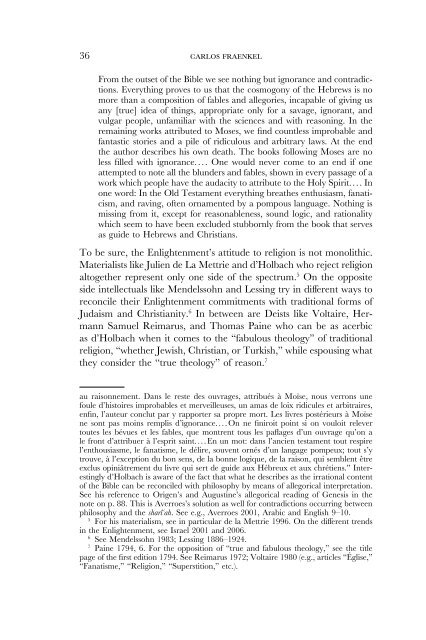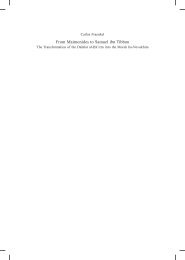Download PDF - Carlos F. Fraenkel
Download PDF - Carlos F. Fraenkel
Download PDF - Carlos F. Fraenkel
You also want an ePaper? Increase the reach of your titles
YUMPU automatically turns print PDFs into web optimized ePapers that Google loves.
36 carlos fraenkelFrom the outset of the Bible we see nothing but ignorance and contradictions.Everything proves to us that the cosmogony of the Hebrews is nomore than a composition of fables and allegories, incapable of giving usany [true] idea of things, appropriate only for a savage, ignorant, andvulgar people, unfamiliar with the sciences and with reasoning. In theremaining works attributed to Moses, we find countless improbable andfantastic stories and a pile of ridiculous and arbitrary laws. At the endthe author describes his own death. The books following Moses are noless filled with ignorance. . . . One would never come to an end if oneattempted to note all the blunders and fables, shown in every passage of awork which people have the audacity to attribute to the Holy Spirit. . . . Inone word: In the Old Testament everything breathes enthusiasm, fanaticism,and raving, often ornamented by a pompous language. Nothing ismissing from it, except for reasonableness, sound logic, and rationalitywhich seem to have been excluded stubbornly from the book that servesas guide to Hebrews and Christians.To be sure, the Enlightenment’s attitude to religion is not monolithic.Materialists like Julien de La Mettrie and d’Holbach who reject religionaltogether represent only one side of the spectrum. 5 On the oppositeside intellectuals like Mendelssohn and Lessing try in different ways toreconcile their Enlightenment commitments with traditional forms ofJudaism and Christianity. 6 In between are Deists like Voltaire, HermannSamuel Reimarus, and Thomas Paine who can be as acerbicas d’Holbach when it comes to the “fabulous theology” of traditionalreligion, “whether Jewish, Christian, or Turkish,” while espousing whatthey consider the “true theology” of reason. 7au raisonnement. Dans le reste des ouvrages, attribués à Moïse, nous verrons unefoule d’histoires improbables et merveilleuses, un amas de loix ridicules et arbitraires,enfin, l’auteur conclut par y rapporter sa propre mort. Les livres postérieurs à Moïsene sont pas moins remplis d’ignorance. . . . On ne finiroit point si on vouloit relevertoutes les bévues et les fables, que montrent tous les paflages d’un ouvrage qu’on ale front d’attribuer à l’esprit saint. . . . En un mot: dans l’ancien testament tout respirel’enthousiasme, le fanatisme, le délire, souvent ornés d’un langage pompeux; tout s’ytrouve, à l’exception du bon sens, de la bonne logique, de la raison, qui semblent êtreexclus opiniâtrement du livre qui sert de guide aux Hébreux et aux chrétiens.” Interestinglyd’Holbach is aware of the fact that what he describes as the irrational contentof the Bible can be reconciled with philosophy by means of allegorical interpretation.See his reference to Origen’s and Augustine’s allegorical reading of Genesis in thenote on p. 88. This is Averroes’s solution as well for contradictions occurring betweenphilosophy and the sharîah. See e.g., Averroes 2001, Arabic and English 9–10.5For his materialism, see in particular de la Mettrie 1996. On the different trendsin the Enlightenment, see Israel 2001 and 2006.6See Mendelssohn 1983; Lessing 1886–1924.7Paine 1794, 6. For the opposition of “true and fabulous theology,” see the titlepage of the first edition 1794. See Reimarus 1972; Voltaire 1980 (e.g., articles “Église,”“Fanatisme,” “Religion,” “Superstition,” etc.).



